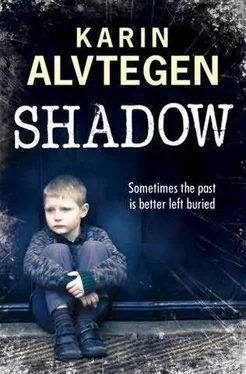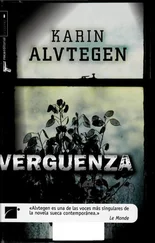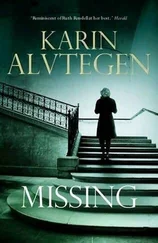‘I’m sorry, Mamma, I’m sorry. I do want you to come, much more than I want Pappa, I promise. I’m sorry.’
Annika came back with a glass of water. Their mother wiped her eyes and put the glass on the nightstand.
‘All right then. We’ll say that. I’ll talk to Axel and make sure he comes too.’
‘There has been no improvement at all, rather the opposite. Axel is actually too ill to remain here. Our beds are intended for patients who can be rehabilitated. But since he is Axel Ragnerfeldt, we’ve decided to let him stay. It’s not definite that he’d be able to get a private room anywhere else, and considering his celebrity and what it means for his integrity, we’ve decided to make an exception.’
That’s what the doctor had told them during the meeting, and Jan-Erik had expressed his gratitude. Then he had spent an hour with his father and confirmed that the medical diagnosis was correct. It was becoming harder and harder to make contact. Jan-Erik had tried to update him on both the news and what was going on culturally, but the question was how much he actually understood.
He found the visits grim. For so long he had dreamt of gaining the upper hand, but when he finally did any sense of satisfaction failed to appear. Instead he was plagued by what would now never happen. He wondered how it would be the day Axel actually died and was gone, how the grief would feel. Because how could he let go of what he’d never had?
He let the motor run and got out to open the gates, noticing that it was time to call the head gardener. The verges were brown with withered perennials, and everything was covered with leaves. One of the supports on the covered patio, built when he was in the States and which nobody had ever used, had blown over and was lying in the grass. The gravel path, the constant bane of his youth, had been infiltrated by grass, and he was thankful that his mother wasn’t with him. She had kept an eye on the gravel and its border with the lawn as if keeping them separate were a matter of life and death, and it had been his task to maintain it – his and Gerda’s and Annika’s.
He returned to his car, drove in and parked in front of the house. There he sat for a while, feeling no hurry to go inside.
It had been a long journey. Perhaps not geographically speaking, but it felt as though life had gone through an endless number of twists and turns since he’d moved out of this house. Over thirty years had passed, and yet it was as if everything led him back here, no matter how he tried to escape its grip. Sometimes he was even homesick, though he didn’t know why. But he only felt that way as long as he was somewhere else. Once he arrived he immediately wanted to leave.
He got out of the car and fished out his house keys. The steps to the front door were covered with leaves, and he swept them off with the broom that had stood guard by the entrance since time immemorial. The ends were worn down from years of use and reminded him of a cheese that had been sliced crooked. Once again Louise appeared in his mind; cheeses cut like a toboggan-run always irritated her, and he had learned to use the cheese-cutter with precision. He sighed. He had placed the business card she’d given him in his wallet, but naturally he hadn’t rung the number. He knew she would ask as soon as he stepped in the door at home.
He unlocked the front door and turned off the burglar alarm, wiping his shoes carefully on the doormat but keeping them on because the floors of the uninhabited house were cold. The heat was kept down to a minimum and was turned up only in the wintertime to keep the water pipes from freezing.
He went into the kitchen and placed the house keys on the wood-stove, looking about to make sure that everything was as it should be. Everything was unchanged and looked the same as always. Only a lamp by the window clashed with his memory, the one he had put there himself and hooked up to a timer. The refrigerator door was ajar with a kitchen towel in the gap, and all work surfaces were bare and clean. Everything lay fallow.
He knew the house inside out, except for the blank spot that made up Axel’s office, an unknown world in all this familiar space. He left the kitchen and went through the silent house. Every nook was inhabited by memories: each door handle, each creaky floorboard, each tiny object. Except for the switches for the ceiling lights, which had been replaced in the eighties when the house was rewired. Every time his hand trailed along the wall and met the unfamiliar shape it was surprised, expecting a different one.
Most things had been left in place after Axel’s stroke, when his mother felt that she could leave the house at last and move into the city. Some of the paintings and most of Axel’s literary prizes, the ones he had received from near and far and which had stood on all the window niches and bookshelves, were now in storage somewhere safe until it was decided what to do with the house. The items that had been removed had left empty spaces behind, giving the house a desolate feeling. The walls were full of mournful borders, left by pictures that had been removed.
He lingered in what they called the library. Dark brown, built-in bookshelves teeming with literature. And yet they were insufficient; the books had escaped from the room and spread like a plague throughout the house with constant demands for new shelves. He hadn’t read a fraction of them, and to be honest he hadn’t even been particularly interested. Or else his indifference may have been a cautious protest, he didn’t know. But he did know that each book represented sacrifices demanded from the family and friends of the author so that it could be written. And nothing else had mattered.
In the room was a framed photograph of Annika. In a gap in the row of books it stood wedged in next to a white porcelain figurine, a little boy who lay resting against a dog. Jan-Erik went over and took down the small frame. He rubbed his sleeve over the dusty glass. She was ten years old in the picture, with five years left to live. Her hair was in pigtails and she was smiling at the camera. He missed her, often wondering how everything would have been if she were still alive. She still felt so familiar, like a part of him; only no one could see her. In appearance she was always twelve years old, the way she was the last time he had seen her. But in his mind she had aged along with him. Or else it could be that in his internal conversations with her he was still back in the time when she was alive. What a person had shared with a sibling could never be transferred to anyone else. It was a relationship built on common experiences, the fact that they were in such close proximity during the stage of life when they had no choice of their own. The fact that they were marked by the same environment. Sometimes he would even type her name into Google to see if there were any others besides him who remembered her. He never got any hits.
She was fifteen years old when she was run over. The driver of the car had never come forward. He didn’t know many details, because it had happened while he was abroad.
With the photograph in his hand he sank into one of the library armchairs. He stroked his finger over her face. He should never have left her alone.
At first it had all been like a dream, too good to be true – he had received a scholarship. His tennis coach, who recognised his talent, had helped him with the formalities. Without him saying a word at home, the application had been sent in and accepted. For three years he would study at a college in Florida and be part of the school’s successful tennis team. Everything had been arranged when he had proudly come home to tell them. He had imagined the scene, how at the dinner table when everyone was gathered together he would take out the letter and pass it around. How he would silently read the astonished reactions on their faces. How his father would be ashamed that he hadn’t understood, and regret that he had never come to watch a match. And finally he would realise that his son had his own rare talent, despite his inability to see poetry in the simplest objects. Unlike his father Jan-Erik was the type who simply saw a dustbin when he saw a dustbin, and not a ‘vessel for unwanted memories’. And there had been a reaction, but not the one he had imagined. His mother congratulated him and then took another gulp of wine, which was to be expected. But his father’s reaction he could not have predicted, not from this man who had never before cared. Sports were not something for intellectuals, Jan-Erik was informed; one might devote oneself to sports in order to keep the body in shape, to oxygenate the blood and thus facilitate the flow of knowledge. Tennis was a sport for the upper class, for spoilt rich kids, and he certainly hoped that his son was not turning into one of them.
Читать дальше












